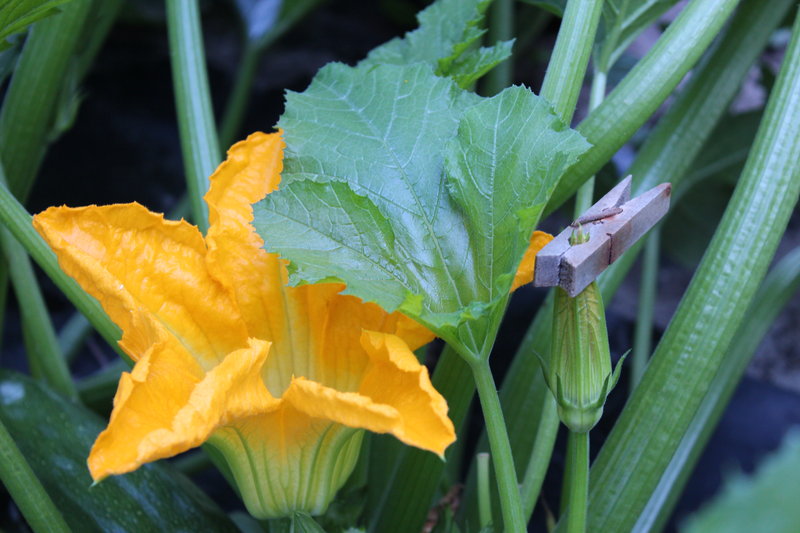Back to August 2015 Newsletter
VSPN Seed Saving Workshops

Paul Hrycyk
Training guides and reference materials can only go so far when it comes to educating growers on new methods of seed production. Some skills are best learned by getting one’s hands dirty and seeing how other growers do it.
I’ve had the opportunity to attend two VSPN workshops this year: one on organic potato trials, which was held at Laepple Organic Farm, and another called “Squash Seed Saving: How to Hand-Pollinate”, which was hosted by Whole Circle Farms.
The Laepples, who own and run a mixed organic farm in Petersburg, Ontario, are trialing new varieties of potatoes as part of a participatory organic breeding project. We were joined at their farm by Duane Falk, a breeding expert from the University of Guelph, who discussed some of the history of breeding in Canada. He also shared best practices for growing potatoes with us, and specifically explained the benefits of planting medium-sized tubers to achieve the best results.
The hand-pollinating squash workshop was equally interesting and informative. Bob Wildfong, Executive Director of Seeds of Diversity, taught us the practical aspects of hand-pollinating squash flowers. Squash plants have open, incomplete (separate male and female) flowers that are cross-pollinated by insects. Because of this, they have to be separated by a large distance, or hand-pollinated, to prevent cross-pollination. Bob showed participants how to use tape or clothespins to seal up flowers the night before they open, so that bees can’t pollinate them the next morning. We also learned that each grain of pollen from a squash flower becomes one seed. So if your pumpkin has 300 seeds in it, it took 300 grains of pollen to make it!
While everyone came to listen and learn from the experts, the discussion generated by the ten or fifteen attendees at each workshop was just as valuable a source of information. Growers exchanged ideas and shared common challenges, solutions that have worked, and practices that haven’t proven to be as useful.
The Vegetable Seed Producers Network is all about working together and reaping the benefits of a community with common goals. Whether it’s bulking up varieties by pooling seeds, exchanging ideas and management practices, or having access to information and expertise, more cooperation and communication between growers will benefit the whole community.
Adding more members to the VSPN will strengthen the network and foster an even more diverse range of discussions and learning experiences. If this sense of community and cooperation is appealing to you, send us an email or give us a call. We are always working to expand the network of growers!
**
Thanks to Aabir Dey, Regional Coordinator for the Bauta Family Initiative on Canadian Seed Security for Ontario, who setup and organized these extremely valuable workshops.
Paul Hrycyk is the project coordinator of the Vegetable Seeds Producers Network.
This project was funded in part through Growing Forward 2, a federal-provincial-territorial initiative. The Agricultural Adaptation Council assists in the delivery of Growing Forward 2 in Ontario.

Not yet a member?
An annual membership to Seeds of Diversity gives you access to our seed exchange, seed grow-out programs, and our online news.

We depend on donations to do our work.

Thank you for your support!
